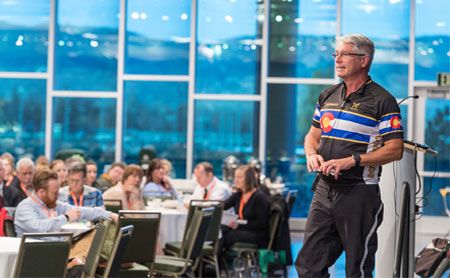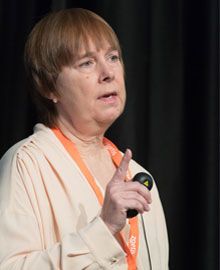AAVMC wellness summit: Progress made and a path forward
International gathering of students and professionals tackles problems with veterinary well-being from every perspective.

Dr. Mark Stetter, dean of CSU's College of Veterinary Medicine and Biomedical Sciences, welcomes all in attendance (Photo courtesy of Colorado State University). The mood was upbeat among participants during the fourth annual American Association of Veterinary Medical Colleges (AAVMC) Veterinary Health and Wellness Summit held in Fort Collins, Colorado, at Colorado State University (CSU) Nov. 4-6.
“The presentations were thought-provoking, clarified the issues we're facing, provided solutions, and showed us where the profession needs to move in the future,” says Laurie Fonken, DVM, LPC, who provides counseling services for CSU DVM students and helped organize the event.
There were, according to Fonken, over 270 participants, 30 presenters, 65 presentations (six keynote), 80 students from 22 schools, 115 administrators and student-support or mental-health staff, and 75 industry partners and veterinary practitioners. This was the first summit to include practitioners.
Juan Samper, DVM, MSc, PhD, an associate dean at Ross University School of Veterinary Medicine, was happy to see practitioners brought into the conversation. His impression is that, after years of turning a blind eye on the problem, the profession is finally asking, “What got us into this mess?”
Answering that question was a big part of the first keynote address by Michele Gaspar, DVM, DABVP, MA, LPC, a feline veterinarian, licensed counselor and former chaplain. She reviewed many factors that influence the general population and thus the pool of students that veterinary colleges draw upon. She challenged school administrators to consider how they may have been unwittingly selecting for those who are at risk for being unable to withstand the rigors of practice.

Michele Gaspar, DVM, DABVP, MA, LPC, speaks during the wellness conference (Photo courtesy of Colorado State University). Gaspar explained that certain early maladaptive schemas-or broad, pervasive themes of self and relationship with others-are often developed in childhood. Those most pertinent to veterinarians include an essential defectiveness and disconnectedness associated with failure and shame resulting in perfectionism and self-sacrifice to seek approval and validation of oneself.
Gaspar also stated that the veterinary profession should seek applicants with a healthy self-esteem and an attitude of being “good enough”-not so perfectionistic that they're hypercritical of themselves and others.
“I was in the dark regarding how much pain was behind the off-handed statement ‘I became a veterinarian because I like animals more than I like people,'” says Heather Loenser, DVM, a veterinary advisor with the American Animal Hospital Association (AAHA). “Many have suffered from interactions with fellow human beings, starting as early as childhood, leading to a preference for the company of pets to people. Now that I know there could be significant trauma behind that statement, I am even more driven to help our colleagues care for themselves and learn to connect and communicate, in a healthy way, with clients, staff and colleagues.”
Ethical terms for veterinary leaders were addressed as well. Gene Crumley, director of leadership development at the University of California, Davis, School of Medicine, in his keynote presentation addressed the importance of leaders having a strong ethical compass, a sense of stewardship, a need to attend to the culture of their organization, a healthy sense of curiosity and, finally, “courageous vulnerability.”
Thomas Meyer, DVM, president of the American Veterinary Medical Association (AVMA), agrees with Crumley. “What needs to be woven into organizations is a culture that allows people to admit their mistakes without fear of punishment,” Meyer says. The only way that will happen, he continues, is if leaders are courageous and vulnerable enough to speak up and admit when they make mistakes and praise their teams for doing the same.
Janet Donlin, DVM, CEO of the AVMA, is a member of the Veterinary Wellness Steering Committee. She says she was impressed with the collaborative efforts that colleagues across the pond have put into place as described in the keynote presentation by Lizzie Lockett, strategic communications director for the Royal College of Veterinary Surgeons (RCVS). Donlin found the RCVS expectations for new veterinary graduates particularly useful.
New graduates must understand and abide by the RCVS Code of Professional Conduct, including “professional competence, honesty and integrity, independence and impartiality, client confidentiality and trust, and professional accountability.” In addition, they must understand the economic and emotional context in which veterinarians work-hence they need to be resilient and confident of their judgment in order to withstand the stresses and conflicting demands they face in the workplace. They must recognize the signs of stress and know how to seek support as needed.
Lockett also discussed the RCVS's Mind Matters Initiative, which addresses mental health and well-being issues in the veterinary profession. She reviewed the 24/7 Vetlife Helpline and a number of other collaborative efforts that bring about a sense of purpose, improve confidence and resilience, and reduce stigma associated with mental issues and seeking help.
JoAnne Roesner, DVM, DABVP, gave a heart-wrenching description of the stigma she faced when confronted with her own addiction and mental illness in her presentation. She reviewed a Centers for Disease Control study that correlated adverse childhood experiences (ACE) with increased risk for a wide variety of illnesses-including a 460 percent increase in the risk of depression and a 1,220 percent increase in the risk of suicide. She described in detail the childhood trauma she experienced and reported that her ACE score was 9/10.
Primary sponsors of the summit
The two primary industry sponsors were VCA and Zoetis.
VCA made a significant financial contribution and also committed the time of Chief Medical Officer Todd Tams, DVM, DACVIM; Vice President of Recruiting Suzanne Russo, DVM, MS; and Maria Druse, VP of human resources.
Druse says, “As a result of our own experiences and losses in the veterinary community, the Summit impressed upon me, and my colleagues, that there is a need for wellness programs focused on the specific challenges faced by veterinary professionals. VCA will be exploring this topic further in the months and years ahead and plans to partner with the colleagues and resources with whom we connected at the Summit.”
VCA offers its employees free counseling through a life assistance program.
Tams states, “We have 165 interns at VCA every year and have been working with psychologists, based as faculty at CSU, to provide support for them on a variety of issues. We tell our interns, ‘When you are here with VCA it is like you are with family. We are here to work with you and support you.'”
Zoetis has supported the AAVMC wellness summit since its beginning four years ago and watched the attendance climb from about 60 at the first summit to 200 last year and almost 300 this year.
“We were honored once again to co-sponsor this summit,” says Christine Jenkins, DVM, DACVIM, Zoetis' chief medical officer. “At this year's summit there was a feeling that a threshold level of participation had been reached for significant positive change to occur, and that there was enough cross-collaboration among key stakeholders in the veterinary profession to come up with relevant solutions.”
“Dr. JoAnne Roesner drove home the point that perfectionism can hide incredible pain and pathology,” says AAHA's Loenser. “Behind the brilliant glare of a shining superstar could be immense suffering and insecurity.”
Roesner says that in spite of her difficulties, today she is a happy person. Her story is one of hope. She reviewed the well-being initiatives she has implemented as medical director of Loving Hands Animal Clinic, such as discouraging overtime, scheduling wellness activities such as yoga, walking and meditation for team members, and encouraging collaboration among staff.
She also described the importance of absolute confidentiality and listening without judgment when staff open up about themselves or a coworker. Roesner emphasized the need to make resources readily available such as lists of low-cost or free mental healthcare providers, professionals covered by group insurance, and 12-step programs and meetings.
Whitney Miller, DVM, MBA, Petco's director of veterinary medicine and a CSU admissions committee member, was impressed with the level of vulnerability that many of the presenters displayed. “The most powerful keynote for me was Betsy Charles',” Miller says. “She not only tied together everything that had been discussed at the summit but also showed a certain level of vulnerability that we need to feel comfortable demonstrating. I've known her for a long time. To see how she has overcome her challenges with perfectionism and other issues, comparing back then to where she is now-it's remarkable.”
Charles, a veterinarian with a master's degree in organizational leadership, works as an assistant professor at Western University of Health Sciences and executive director of the Veterinary Leadership Institute. Her presentation included a spoken word performance that succeeded in modeling courageous vulnerability, which is what she thinks veterinarians need to do if they are going to make a dent in the well-being issues they face. So she gave attendees an example of how to be courageous and vulnerable. She spoke the words her father said when she was growing up, words that pushed her toward perfectionism. She mixed in words from other presentations, tying everything together.
“People listening to her can learn coping skills and how to feel like they don't have to be perfect all the time,” Miller says. “They can look at their family and academic history and identify trigger points that make them feel like they are not good enough.”
In addition to the keynote presentations, a number of impressive speakers addressed a wide variety of topics. Mike Cavanaugh, DVM, DABVP, AAHA's executive director, says, “My strongest memory of the summit is Marie Holowaychuck saying, ‘If you don't have time to meditate for 10 minutes a day, you should probably meditate for an hour.' That made me stop and think that a small investment in time could totally change your day.”
Marie Holowaychuck, DVM, DACVECC, CYT, is part of a groundswell of support coming from within the veterinary profession, people who gave presentations on topics from mindfulness to gratitude to increasing resilience. There were also presentations by mental health professionals, students and administrators, many of which focused on what has worked for them and what has not.
There were repeated comments from participants that this was one of the most well-run and uplifting conferences they had experienced, and I concur. Descriptions of the current state of affairs can be daunting, but there was a feeling of hope that blossomed into optimism as the summit progressed.
Many of us, such as Mark Stetter, DVM, dean of the CSU College of Veterinary Medicine, left the summit with a to-do list to work on, collaborations to foster and an expectation that we can make headway and improve our profession's well-being. There have been many changes in organized veterinary medicine over the last few years. With the last AVMA convention focus on well-being and our profession's participation at this summit, I've never been more proud of the veterinary profession than I am today.
Tad B. Coles, DVM, MRSS-P, CCFP, is a medical writer and founder of Compassion Fatigue Coach in Overland Park, Kansas.